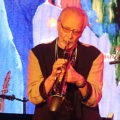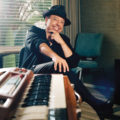“Wish Upon A Star” when trumpeter Herb Alpert, Lani Hall take Vic Theatre to Tijuana, Brasil, today
 Photos provided by Dewey Nicks
Photos provided by Dewey Nicks
As an artist, Herb Alpert revolutionized the trumpet since the days of the Tijuana Brass outselling The Beatles by double, through frequently sampled solo re-inventions and acclaimed collaborations with his wife, former Brasil ’66 singer/home towner Lani Hall.
Behind the scenes, he’s of course the “A” in A&M Records, responsible for signing everyone from The Carpenters and Cat Stevens to Janet Jackson and Sting, all while juggling his own chart-topping recordings, plus painting and sculpting professionally.
He may be 88-years-old at the moment, but that hasn’t stopped the multiple record-breaker and recipient of basically every award imaginable from recording a 49th studio album, “Wish Upon A Star,” or calling Chicago Concert Reviews on the way to the Vic Theatre with Hall on Saturday, September 16 for a jazzy history lesson stretching back to the early 1960s.
You’re coming back to Chicago with with Lani Hall. What’s your relationship with the city?
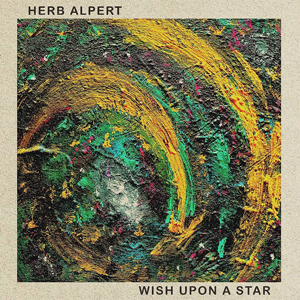 Herb Alpert: I love the city, not because of just Lani, but it’s a beautiful city. I think it’s well designed and it’s a far cry from where I live here in Los Angeles. It’s kind of that helter skelter design (laughs) and Chicago seems it has a plan. They follow through with the plan and I love it.
Herb Alpert: I love the city, not because of just Lani, but it’s a beautiful city. I think it’s well designed and it’s a far cry from where I live here in Los Angeles. It’s kind of that helter skelter design (laughs) and Chicago seems it has a plan. They follow through with the plan and I love it.
Are there any previous performances in the area that stick out in your mind?
Alpert: Oh yeah, there’s a couple. When I first played in Chicago with the Tijuana Brass, this was probably 1965 or 1966, we played at Arlington [Park] out on the race track. They had a whole stand set up for us and that’s where we played. It was kind of an unusual night, but it was a really nice night. The other was McCormick Place. We played at McCormick Place several times, but the last time we played there, after the show we went on to New York and I read in the paper the next morning that McCormick Place had burned, not down completely, but it burned up right after our show and we lost some of our equipment…I was the last artist to play at McCormick Place before it burned.
What’s in store specially for the Vic Theatre?
Alpert: We have this show that we’ve been doing, not the same show, but we’ve been doing concerts for the last 15 years, Lani and I, and a small group behind us that is just a trio. Each member of the trio is a gifted musician. I like to keep it small like that and I like to keep it transparent. We do various types of songs. Of course I’ll do a Tijuana Brass medley and Lani will do a Brasil ’66 retrospective, but around that, we just play songs that we like to play. I always want it to be of the moment. I’m basically a jazz musician and I don’t like cookie cutter arrangements where it has to be exactly the same way each time you play it. I don’t like that. I like the musicians behind us to be free. Lani and I are free to express ourselves in the way its appropriate for that particular night and it’s a lot of fun for me to do it that way.
It’s of course part of a much larger tour behind “Wish Upon A Star,” your 49th studio album. What’s led you to staying so prolific?
Alpert: Well, I’m passionate about it. I love playing. I started playing when I was eight and I play just about every day of my life, not just to stay in shape, but to experience the feeling of making music. I like that feeling of learning to play an instrument. You never get to the end product. You never get to that place where you say, “Ah, I’ve accomplished that. Now I know how to do it.” You never get there, so that’s the pursuit. I love that pursuit. I’m a right brain guy. I paint and sculpt professionally, handled by a gallery, and I’ve been doing that for 50 years, so I’m grateful that I’m able to do what I love when I wake up in the morning.
How would you say those other endeavors have shaped your artistry?
 Alpert: I try to be as free as I can possibly be as an artist. I try to express myself the way I was intended to express myself. I had an experience with the horn years back when I had a problem playing. I was not getting that first note out right. I was stuttering through the instrument and I was really frustrated by that because I never thought about how you play the instrument, and all of a sudden, I couldn’t really do what I wanted to do on it. So I heard about this trumpet teacher. Well, he wasn’t a trumpet teacher. He was a brass teacher in New York City. His name was Carmine Caruso and he used to teach brass instrument players that had problems. He was called “the troubleshooter.” If you had problems playing, you’d call Carmine. So I called Carmine, got together with him, with Lani, one afternoon. I asked Carmine if he thought I should change my mouth piece, if I should change my trumpet. “[If] it’s not the right set up, maybe it’s giving me a problem.” He said, “Look at here kid, this trumpet is just a piece of plumbing that you’re playing. It’s just a series of pipes. You’re the instrument. The sound comes from within you,” which was a big “a-ha, that’s it,” that period.
Alpert: I try to be as free as I can possibly be as an artist. I try to express myself the way I was intended to express myself. I had an experience with the horn years back when I had a problem playing. I was not getting that first note out right. I was stuttering through the instrument and I was really frustrated by that because I never thought about how you play the instrument, and all of a sudden, I couldn’t really do what I wanted to do on it. So I heard about this trumpet teacher. Well, he wasn’t a trumpet teacher. He was a brass teacher in New York City. His name was Carmine Caruso and he used to teach brass instrument players that had problems. He was called “the troubleshooter.” If you had problems playing, you’d call Carmine. So I called Carmine, got together with him, with Lani, one afternoon. I asked Carmine if he thought I should change my mouth piece, if I should change my trumpet. “[If] it’s not the right set up, maybe it’s giving me a problem.” He said, “Look at here kid, this trumpet is just a piece of plumbing that you’re playing. It’s just a series of pipes. You’re the instrument. The sound comes from within you,” which was a big “a-ha, that’s it,” that period.
If you’re gonna be an artist, you have to express yourself the way you’re intended to be able to express yourself. That’s my way of expressing my thoughts to younger musicians that ask me, “How do you get through the maze? How do you get going in this?” I say, “First off, you have to be passionate about it and you certainly have to find your own voice, your own way of expressing yourself, not the way Miles Davis did, not the way Harry James did, not the way Thelonious Monk did, whatever instrument you play, it’s the way you play. If you don’t put yourself against these other musicians you happen to like, you’re in good shape. You don’t want to have to emulate or try to copy anybody,” so that’s what I try to get to young students, that idea of what Miles gave me [as] the ultimate compliment. He said, “You hear three notes and you know it’s Herb Alpert.” That’s beautiful, but that’s the way it should be.
How would you describe the theme and the song selection process on your latest endeavor?
Alpert: The selection is just songs that come up in my brain randomly. About 20 or 25 years ago, I saw this movie, “Smokey And The Bandit,” and there was a theme song playing that was written by Jerry Reed, the famous country artist. He was in the movie as well. He was driving an 18-wheeler while this song, [“East Bound And Down”], was playing. There was something about the tune that stuck in me. For many, many years I had to get that melody. It was haunting. It wasn’t something I needed to do, but I wanted to try to do it in a way that hasn’t quite been done before, so I took a crack at it. I started playing it, and two weeks later, I played at the Grand Ole Opry because they heard this song and they loved the way I did it. I had an amazing night that I never thought I would ever had playing in Nashville at the Grand Ole Opry, so songs just kind of pop into my head, songs that I like.
“When You Wish Upon A Star,” the long title of that song, obviously is from a Disney movie, [“Pinocchio”], and I just always loved the idea that the lyric is, “When you wish upon a star, makes no difference who you are.” That just resonates with me. I love that idea. The other songs, let’s see, I do a song that honors The Carpenters. I did “We’ve Only Just Begun.” I signed The Carpenters to A&M Records in 1970, and little by little, they became one of our biggest artists, so I wanted to do something for them. Unfortunately, the lead the vocalist Karen passed away at a very young age. I always will remember her and think fondly of her. That song reminds me of her and The Carpenters.
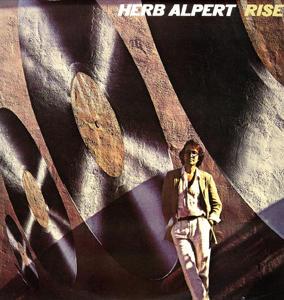 How do you feel like you’ve evolved from the Tijuana Brass Band days through today?
How do you feel like you’ve evolved from the Tijuana Brass Band days through today?
Alpert: Well, I’m basically a jazz musician, you know? I’ve evolved naturally. It’s a tough one because I sold so many records as the Tijuana Brass and with that particular sound that I think I’m kind of pigeonholed in, “Hey, that’s the type of musician I am.” But I kind of broke the mold in 1979 when I had that record “Rise.” It was number one in the country and it was completely different than anything I had done with the Tijuana Brass.
What was it like to step up to the microphone for “This Guy’s In Love With You” and become the only person to ever top the charts as both a vocalist and instrumentalist?
Alpert: Yeah, that’s quite a record. I believe that’s a good one. That’s gonna be a hard one to break (laughs). It just happened by accident. Burt Bacharach was a dear friend of mine. I was doing his television show in 1967 or 1968 and the director asked me if I would sing a song. He didn’t want to keep photographing me with a trumpet in my mouth, so I asked Burt if he thought there was a song that I could handle or a song that maybe he didn’t get a right recording of, but he’d like to give me a shot at it as well…It happened by accident. I never thought I’d have a hit record as a vocalist. I never thought about it like that, but it happened because of the exposure of the television show, plus Burt did the arrangement. He played piano on it and gave me the ideas that catapulted this record. It made lots of noise. I get people coming up to me all the time saying, “Man you know that tune ‘This Guy’s In Love With You’ played at my wedding in China, in Hawaii” and all sorts of exotic places. I say, “oh, that’s beautiful” and nine times out of ten I’ll say, “Are you still married to the same person?” And they’ll say something like “not to that creep” (laughs). It’s been fun.
Your record of having four albums in the Top 10 all at once hasn’t been touched until Taylor Swift. What is your message to her on matching such an incredible accomplishment?
Alpert: Actually, I sent her a little note and a video. I think she’s wonderful. She’s a great artist, seriously. She has complete understanding of her audience. She’s smart, she’s very musical and I have no problem with it. I think she deserves that. Actually, I had five records in the Top 20. There was one record that was number 18 or so at the time. I had four in the Top 10. I don’t know why I’m throwing that in, but it was just one of those moments that will probably never be duplicated cause music now is a whole different situation than it was when I was in my heyday, in the ‘60s, with the Tijuana Brass. Records are different now. Radio is different. The way of promoting records is different. It’s another world. I started out with mono machines, then stereo, then three-track, five-track, on and on. Then, all of a sudden, the digital age came and we had as many tracks as you wanted to use. It’s just another world. It was beautiful. It still is beautiful, can be beautiful. It’s just a little different way of doing it.
Along the way, many others have sampled your music. How does that feel when it happens?
 Alpert: I think it’s not the most creative thing that these other artists do. I’m not in favor of it. Of course, I’ve been the recipient of the Biggie record, [The Notorious B.I.G.’s “Hypnotize”], which was a huge monster hit with using “Rise,” but I’m not in favor of that concept. I mean, I think these artists, these producers should use their own imagination to put their records together instead of using someone else’s motor.
Alpert: I think it’s not the most creative thing that these other artists do. I’m not in favor of it. Of course, I’ve been the recipient of the Biggie record, [The Notorious B.I.G.’s “Hypnotize”], which was a huge monster hit with using “Rise,” but I’m not in favor of that concept. I mean, I think these artists, these producers should use their own imagination to put their records together instead of using someone else’s motor.
You surely have an interesting perspective because you were also half of A&M Records. Tell us a bit about being an artist and executive, which is a very rare combination.
Alpert: The key is have a great partner (laughs). I was lucky to have Jerry Moss. We did A&M Records on a handshake and it just started with one record that we weren’t intending to have a record company per se. We wanted to just release a record, which we did, “The Lonely Bull” in 1962, and it became a big hit. Some of our distributors that Jerry got thought we should just take the money and run. They thought that would be our wise move, but we wanted to see how long we could hang on to the company, so one thing led to another. The Tijuana Brass got a little cold at one point, then we got lukewarm, lukewarm, then we got hot, hot, hot when I did that record “A Taste Of Honey.” That was like the real big door opener for the Tijuana Brass, and from that point on, we were sailing for awhile. It was just whatever we put out seemed to sell, but it wasn’t like I was pumping out records just because we had the advantage. I tried to make every record and every arrangement special. I wasn’t trying to copy “The Lonely Bull” and do “The Lonely Bull” sideways. I just wanted to see how far I could take this sound that I knew was a good sound, so that was what I was doing. I got very lucky. The timing was right. I don’t think we could do that in today’s environment.
Who were some of your proudest discoveries for the label?
Alpert: Of course The Carpenters. They probably, at this point, have outsold most of our A&M Records artists. I think Sergio Mendes & Brasil ’66. We had Quincy Jones, Janet Jackson, Sting and The Police. I think Sting is just a really unusual artist. He’s not only a great artist, he’s a great songwriter. He’s a gentlemen, a smart human being and very empathic to life, and the others less fortunate. We had some great jazz artists as well, Stan Getz, Paul Desmond at one time, Gerry Mulligan, but I’m really proud of the company. There were really lots of different types of artists and we got out of the artists’ way, let them do what they had to do. I recorded for a major company before A&M Records. I was with RCA Victor and I didn’t like the way I was being treated. They treated me like a number, so I filed that, thought, “If I ever had a chance to have my own company, I would make it artist first.” A&M Records always revolved around the artist, what we could do to make them comfortable so they could go in the studios, be themselves and express themselves the way they were at, a nice formula.
You’re also one of the few artists whose album covers are as iconic as what’s inside. What’s the secret to captivating cover art?
Alpert: Yeah, have creative people around you (laughs) that are really artistic. That’s the key. There’s no magic to that.
Do you still get people asking you to sign and talk about those classic covers?
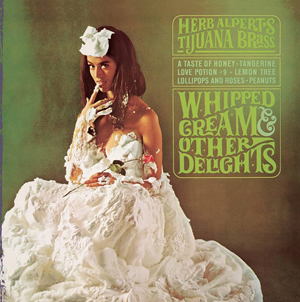 Alpert: Oh man, wherever we go. On the record, I never liked that cover of “Whipped Cream & Other Delights.” I didn’t think it represented the album when the art director, Peter Whorf, who designed it, came into the studio while I was recording the “Whipped Cream” album. I looked at it and I didn’t get it. Yeah, she’s pretty, she’s seductive and all the stuff, but I’m glad I was talked into it by my partner. It’s been an iconic cover and I’m glad we did it, but if we had used my judgement at the time, it wouldn’t have been on the cover.
Alpert: Oh man, wherever we go. On the record, I never liked that cover of “Whipped Cream & Other Delights.” I didn’t think it represented the album when the art director, Peter Whorf, who designed it, came into the studio while I was recording the “Whipped Cream” album. I looked at it and I didn’t get it. Yeah, she’s pretty, she’s seductive and all the stuff, but I’m glad I was talked into it by my partner. It’s been an iconic cover and I’m glad we did it, but if we had used my judgement at the time, it wouldn’t have been on the cover.
Did you paint the art for “Wish Upon A Star”?
Alpert: Yes, I painted it. I’ve been painting for 50 years professionally. I’ve had shows in Europe and also the United States, so I spend a good deal of my time painting. I have over a thousand paintings and I’m building a beautiful warehouse gallery in Palm Springs for my art.
You also have the Herb Alpert Foundation and the Herb Alpert Award in the Arts. What led you to those ventures?
Alpert: I started the foundation in the early ‘80s. I feel like so much has happened to me because when I was eight-years-old, I had the good fortune of picking up a trumpet in a music class I had. It had a table filled with various instruments and I picked up the trumpet. I couldn’t make a sound out of it, but when I finally did, the trumpet was speaking for me cause I’m an introvert. I’m a card carrying introvert and that horn was saying things I couldn’t get out of my mouth, so it’s been a great friend for me. It obviously changed my life. I think it was beautiful for other folks to have that opportunity, other kids. I think art is the heartbeat of our society, not just painting and sculpting, but all of ‘em. Poetry, acting, it’s important to support the artists. We need to do that if we want a society that lives, breathes and is honest about what we do.
Have you ever eyed retirement or do you indefinitely have sights set on future projects?
Alpert: As long as I can blow the horn and feel good about it (blows a sample), you know what I mean? I do that about every day, not because I have to, but I love to. And like I said, you never get to the end product, so you try to inch up on the art and truth of it all. My sister’s gonna be 97 in a few days and she says, “Why in the world are you traveling, schlepping around the country and world doing that? You don’t need to do that anymore.” I said, “Well, I need to do that because it gives me energy.” And when I do these concerts, I get energy from these concerts. It’s not like I’m on a victory tour wanting people to say, “aren’t I wonderful?” I just do it because I have to do it and I get a chance to make a lot of people happy with the music. I try to make positive music, so I think it’s fun to listen to, and for 15 years, so many people have been so happy because we’ve played in their area. That’s my reward. It’s like a win-win for me. I win because I get energy from it and the audience wins because they enjoy seeing us. And the concerts are very casual. They’re very open. People can ask questions and there’s a lot of visuals. You’ll see all sorts of objects on the screen, retrospective videos, that I think really work. It’s not like a thing I want to try to make as much money as I can. I just feel like it’s a great service to others as well.
Herb Alpert & Lani Hall perform at the Vic Theatre on Saturday, September 16. For additional details, visit HerbAlpert.com, LaniHall.com and JamUSA.com.


